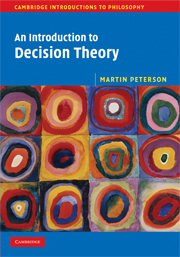Book contents
- Frontmatter
- Contents
- Preface
- 1 Introduction
- 2 The decision matrix
- 3 Decisions under ignorance
- 4 Decisions under risk
- 5 Utility
- 6 The mathematics of probability
- 7 The philosophy of probability
- 8 Why should we accept the preference axioms?
- 9 Causal vs. evidential decision theory
- 10 Bayesian vs. non-Bayesian decision theory
- 11 Game theory I: Basic concepts and zero-sum games
- 12 Game theory II: Nonzero-sum and cooperative games
- 13 Social choice theory
- 14 Overview of descriptive decision theory
- Appendix A Glossary
- Appendix B Proof of the von Neumann–Morgenstern theorem
- Further reading
- Index
11 - Game theory I: Basic concepts and zero-sum games
- Frontmatter
- Contents
- Preface
- 1 Introduction
- 2 The decision matrix
- 3 Decisions under ignorance
- 4 Decisions under risk
- 5 Utility
- 6 The mathematics of probability
- 7 The philosophy of probability
- 8 Why should we accept the preference axioms?
- 9 Causal vs. evidential decision theory
- 10 Bayesian vs. non-Bayesian decision theory
- 11 Game theory I: Basic concepts and zero-sum games
- 12 Game theory II: Nonzero-sum and cooperative games
- 13 Social choice theory
- 14 Overview of descriptive decision theory
- Appendix A Glossary
- Appendix B Proof of the von Neumann–Morgenstern theorem
- Further reading
- Index
Summary
Game theory studies decisions in which the outcome depends partly on what other people do, and in which this is known to be the case by each decision maker. Chess is a paradigmatic example. Before I make a move, I always carefully consider what my opponent's best response will be, and if the opponent can respond by doing something that will force a checkmate, she can be fairly certain that I will do my best to avoid that move. Both I and my opponent know all this, and this assumption of common knowledge of rationality (CKR) determines which move I will eventually choose, as well as how my opponent will respond. Thus, I do not consider the move to be made by my opponent to be a state of nature that occurs with a fixed probability independently of what I do. On the contrary, the move I make effectively decides my opponent's next move.
Chess is, however, not the best game to study for newcomers to game theory. This is because it is such a complex game with many possible moves. Like other parlour games, such as bridge, monopoly and poker, chess is also of limited practical significance. In this chapter we shall focus on other games, which are easier to analyse but nevertheless of significant practical importance. Consider, for example, two hypothetical supermarket chains, Row and Col.
- Type
- Chapter
- Information
- An Introduction to Decision Theory , pp. 212 - 239Publisher: Cambridge University PressPrint publication year: 2009

